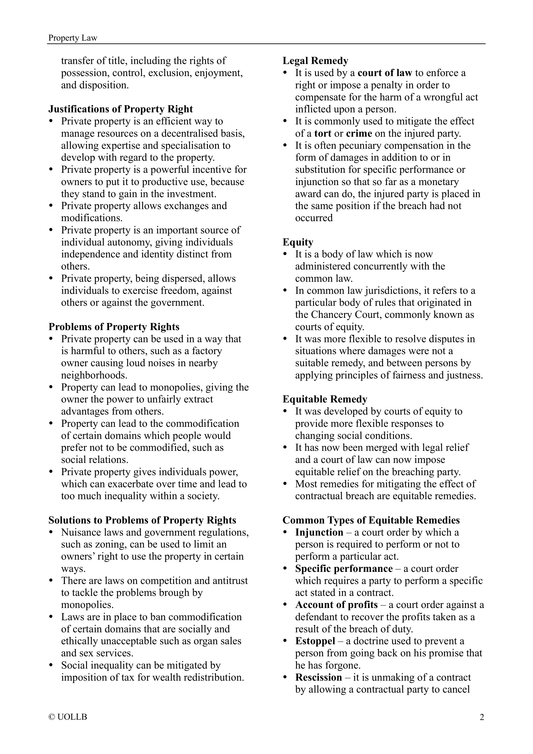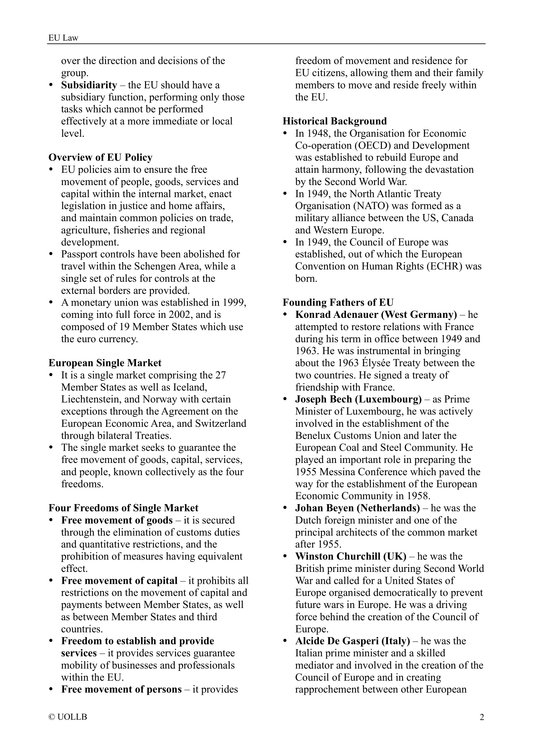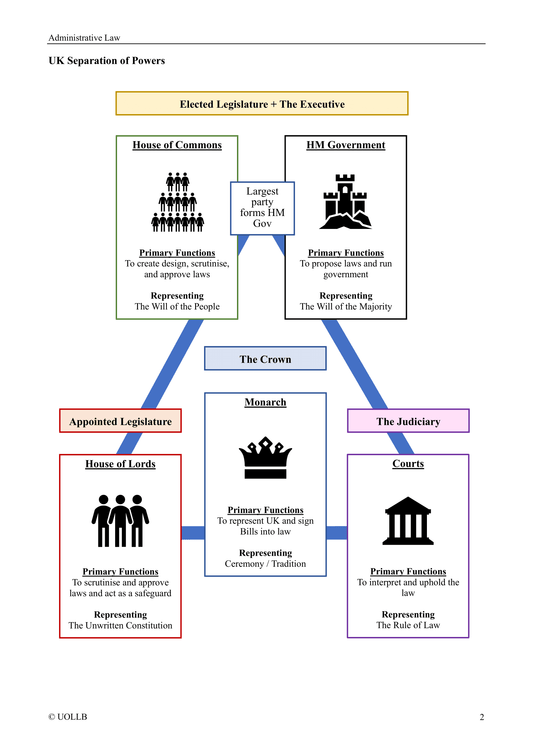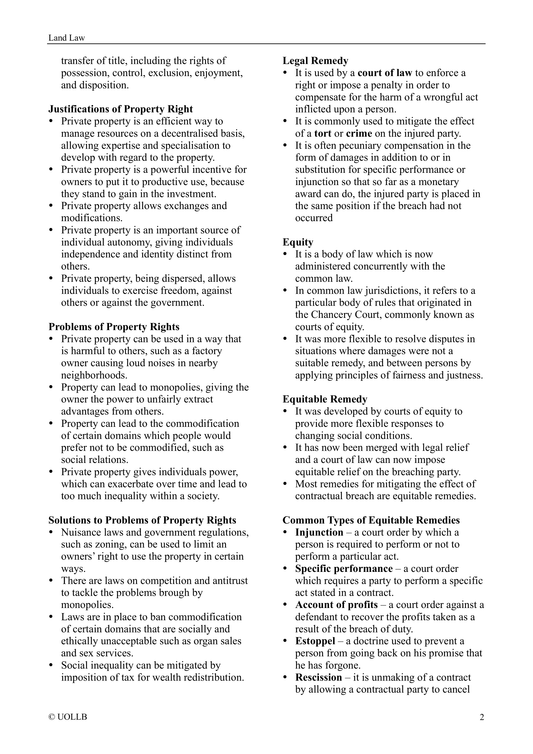Collection: LLB Bachelor of Laws
Study with high-performance law notes to revolutionise your study method and exam strategy to excel in the Bachelor of Laws LLB programme. All difficult legal concepts are turned into digestible bullet points, arranged in a memorable sequence, and supported by case law and statute law. You will learn more efficiently from our law notes than from your textbooks or subject guides. Get an unparalleled advantage over your peers in law exams before it is too late.
-
All 30 Law Modules (Best Value)
Regular price £129.99 GBPRegular priceUnit price / per£454.61 GBPSale price £129.99 GBPSale -
UOL Bachelor of Laws (LLB) Total Preparation
Regular price £119.99 GBPRegular priceUnit price / per£327.71 GBPSale price £119.99 GBPSale -
All 18 UOL Modules (UOL International Programme)
Regular price £109.99 GBPRegular priceUnit price / per£285.74 GBPSale price £109.99 GBPSale -
12 Qualifying LLB Modules (UOL Standard Entry Route)
Regular price £99.99 GBPRegular priceUnit price / per£201.80 GBPSale price £99.99 GBPSale -
9 Qualifying LLB Modules (UOL Graduate Entry Route)
Regular price £89.99 GBPRegular priceUnit price / per£159.83 GBPSale price £89.99 GBPSale -
First Year LLB Modules (UOL Standard Entry Route)
Regular price £49.99 GBPRegular priceUnit price / per£89.88 GBPSale price £49.99 GBPSale -
First Year LLB Modules (UOL Graduate Entry Route)
Regular price £39.99 GBPRegular priceUnit price / per£75.89 GBPSale price £39.99 GBPSale -
Second Year LLB Modules (UOL Standard Entry Route)
Regular price £49.99 GBPRegular priceUnit price / per£89.88 GBPSale price £49.99 GBPSale -
Second Year LLB Modules (UOL Graduate Entry Route)
Regular price £39.99 GBPRegular priceUnit price / per£75.89 GBPSale price £39.99 GBPSale -
Third Year LLB Modules (UOL Standard Entry Route)
Regular price £49.99 GBPRegular priceUnit price / per£89.88 GBPSale price £49.99 GBPSale -
Third Year LLB Modules (UOL Graduate Entry Route)
Regular price £39.99 GBPRegular priceUnit price / per£75.89 GBPSale price £39.99 GBPSale -
Contract Law
Regular price £13.99 GBPRegular priceUnit price / per -
Criminal Law
Regular price £13.99 GBPRegular priceUnit price / per -
Public Law
Regular price £13.99 GBPRegular priceUnit price / per -
Legal System and Method
Regular price £13.99 GBPRegular priceUnit price / per£18.97 GBPSale price £13.99 GBPSale -
Property Law
Regular price £13.99 GBPRegular priceUnit price / per -
Commercial Law
Regular price £13.99 GBPRegular priceUnit price / per -
Family Law
Regular price £13.99 GBPRegular priceUnit price / per -
International Protection of Human Rights
Regular price £13.99 GBPRegular priceUnit price / per -
Administrative Law
Regular price £13.99 GBPRegular priceUnit price / per -
Equity and Trusts
Regular price £13.99 GBPRegular priceUnit price / per -
Company Law
Regular price £13.99 GBPRegular priceUnit price / per -
Intellectual Property
Regular price £13.99 GBPRegular priceUnit price / per -
Jurisprudence and Legal Theory
Regular price £13.99 GBPRegular priceUnit price / per -
Conflict of Laws
Regular price £13.99 GBPRegular priceUnit price / per -
Employment Law
Regular price £13.99 GBPRegular priceUnit price / per -
Public International Law
Regular price £13.99 GBPRegular priceUnit price / per -
Wills and Administration of Estates
Regular price £13.99 GBPRegular priceUnit price / per -
International Human Rights Law
Regular price £13.99 GBPRegular priceUnit price / per -
Private International Law
Regular price £13.99 GBPRegular priceUnit price / per -
Constitutional Law
Regular price £13.99 GBPRegular priceUnit price / per -
Criminal Practice
Regular price £13.99 GBPRegular priceUnit price / per

UOLLB SQE Turbocharge
Get ready for the SQE1 with high-performance SQE Study Guides developed by UOLLB, edited by lawyers, and published by UOL Press to revolutionise your study method and exam strategy.

UOL Case Bank
Upon joining, you become a valuable UOL student and gain instant access to over 2,100 essential case summaries. UOL Case Bank is constantly expanding.
Speed up your revision with us now👇
Join students and legal professionals from Legal 500 firms, top universities and international organisations who trust UOLLB First Class Law Notes
Council of Europe
Crown Prosecution Service
Baker Mckenzie
Linklaters
Yale University
University of Chicago
Columbia University
New York University
University of Michigan
INSEAD
University of London
University College London (UCL)
London School of Economics (LSE)
King’s College London (KCL)
Royal Holloway, University of London
Birkbeck, University of London
SOAS, University of London
University of Manchester
University of Zurich
University of York
Brandeis University
University of Exeter
University of Sheffield
Boston University
University of Washington
University of Leeds
University of Law
University of Kent
University of Hull
Queen’s University Belfast
Arizona State University
McGill University
Toronto Metropolitan University
University of Hong Kong (HKU)
Hong Kong University of Science and Technology (HKUST)
University of Buckingham
Robert Gordon University
ESSEC Business School
Your perfect companion for open-book or closed-book exams
-

Diagrams and Charts
Our carefully designed diagrams and charts will guide you through complex legal issues.
-

Clear and Succinct Definitions
Key concepts are concisely defined to help you understand legal topics quickly.
-

Statutory Provisions
Statutory provisions are provided side by side with legal concepts to help you swiftly locate the relevant legislation.
-

Case Summaries
We have summarised important cases for you so that you don't need to read long and boring cases.
-

Rules and Exceptions
Rules and exceptions are clearly listed so that you know when a rule applies and when it doesn't.
-

Terminology
Legal terms and key concepts are explained at the beginning of each chapter to help you learn efficiently.
-

Case Law
Case law is provided side by side with legal concepts so that you know how legal principles and precedents were established.
-

Law Essay Guide
You will learn essential law exam skills and essay writing techniques that are not taught in class.
-

Problem Question Guide
We will show you how to answer problem questions step by step to achieve first-class results.
-

Structured Explanations
Complex legal concepts are broken down into concise and digestible bullet point explanations.
-

Legal Research
You will learn legal research techniques with our study guide and become a proficient legal researcher.
-

Exam-focused
All essential concepts, principles, and case law are included so that you can answer exam questions quickly.
Let customers speak for us
from 8 reviewsThese law exam skills genuinely made a huge difference in my law exams. For the first time, I feel confident knowing how to structure my answers to actually get good marks. So glad to have found UOLLB before my exams!

This guide is easy to understand. The concepts are clearly explained. Highly recommended for law students or anyone who wants to study common law.

These notes are so helpful. Well worth it.

The notes have saved me so much time and was highly informative.

Wonderful as usual! These notes have always been so helpful and I really a, thankful for this product

The information is effectively presented. The notes are very succinct for efficiently learning. I would like to recommend UOLLB to all law students.

I opine that the UOLLB Employment Law notes are an excellent work for all intending users.
I purchased the set of "Al 26 UOLLB Notes in October,2023" for my daughter who is a student at UWE Bristol.These notes have greatly helped her in her 1st Year Studies.As I said last year, the UOLLB Notes are a great resource not only to students of law but law practitioners as well as they are a very handy source of legal knowledge even for subjects one did not or is not studying.
I will send you the email where you sent me already downloaded notes.Can I benefit from the offer to upgrade these notes with the 2024 revised version thereof ?
Kind regards,
Titus W. Mulindwa
Deputy Legal Counsel
Bank of Uganda
[****]
[****]
[****] (WhatsApp number).










































































